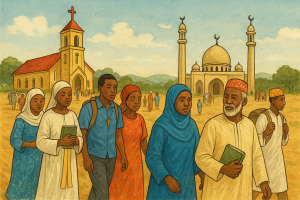About 1,400 years ago, the last Messenger of Allah, Prophet Muhammad (peace and blessings of Allah be upon him), once urged Muslims to hasten to make the journey for the Holy Pilgrimage to Saudi Arabia “before you are prevented.” It was a simple admonition, but many of us did not grasp its depth until now.
The Punch newspaper recently reported that the Federal Government, under President Bola Ahmed Tinubu, has halved the cost of the Christian pilgrimage to Jerusalem for 2025, thereby making it more affordable for those intending to embark on the journey.
The paper quoted the National Secretary of the Christian Pilgrims Board, Bishop Stephen Adegbite, as saying that the federal government had slashed by half the amount each Christian pilgrim would pay this year.
According to the report, the government would cover the balance of the cost for the pilgrimage, which is scheduled to begin on September 14 and last for 10 days at the Imo Airport.
Meanwhile, a couple of weeks earlier, the National Hajj Commission of Nigeria (NAHCON) announced that intending Muslim pilgrims to Saudi Arabia in 2026 would need to deposit N8.6 million each.
This contrast highlights the challenges faced by ordinary Nigerians. On the one hand, the minimum deposit for Hajj is N8.6 million, in a country battling widespread poverty, hunger, and hardship. On the other, the Christian pilgrimage cost has been heavily subsidised. Today, only a few privileged groups—top government officials, members of the National Assembly, and some wealthy individuals—appear able to live comfortably in Nigeria. The middle class is fast disappearing.
It is worth noting that the N8.6 million is only a deposit. In Nigeria, once prices for services are fixed, they rarely come down, and even where they do, the reduction is often negligible.
This disparity in treatment between the two pilgrimages is emerging during the president’s first term, a period when one might expect efforts to build broader national goodwill. Many adherents of the Muslim faith, who also formed a significant part of the voting population in 2023, are now expressing concerns about being sidelined.
Some observers speculate that the government’s policy choices may carry political risks ahead of the 2027 elections. A president seeking reelection is generally expected to maintain support across religious and regional lines. Alienating a significant segment of the electorate could have consequences, regardless of institutional control.
Questions have also been raised about the extent to which Northern Muslims are represented in government decision-making. Some argue that, despite occupying positions of authority, their voices do not seem to influence policies in ways that address the concerns of their constituencies. Others suggest that the pressure of political loyalty often outweighs regional advocacy.
At the same time, many elected representatives appear disengaged from their communities. Constituents often complain of difficulty reaching their lawmakers, who are seen as preoccupied with official business in Abuja. This disconnect fuels the perception that ordinary people are left to cope with hardship on their own.
Nigeria’s challenges are many, and managing religious balance in sensitive matters like pilgrimage is one of them. The hope of the people is for fairness and equity in government policies, irrespective of faith or region.
May God guide Nigeria’s leaders to act justly and strengthen unity among the people.
Malumfashi wrote from Katsina.


